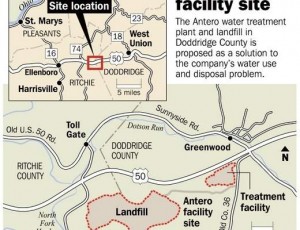Letter from Barbara Daniels, Nicholas County, WV, August 4, 2014
With three high-priced lawyers and an imported team of experts, Antero Resources LLC and the WV DEP recently steam-rolled over a one-man appeal to temporarily stop construction of a 447-acre frack-waste dump in Doddridge County at the Ritchie border.
WV Mountain Party Environmental Justice Committee member, Tom Rhule, had compiled an extensive roster of damning facts, complete with subpoenas for WV officials and their documents. However, though accepting Antero’s experts, the Environmental Quality Board quashed Rhules’s subpoenas, saying there would be plenty of time for his witnesses at the September permit hearing–after the dump was fully operational.
Antero claims this facility will solve a problem Antero causes. Every time a natural gas well is horizontally hydrofractured, millions of gallons of toxic, radioactive waste are produced. Each well is fracked up to ten times in 20 years, with as many as 24 wells per pad. The water for this is typically drawn from local rivers and streams.
Where the water goes after it’s thus been poisoned is a major problem. Although Antero’s fracking operations have ruined numerous water wells in Doddridge County, the facility will purify waste water only enough for reuse in fracking. It will pollute every fresh water source it contacts.
Moreover, Antero proposes to transport the resulting radioactive waste to an out of state licensed facility. Yet that company has never been required to either transport or pay for proper disposal of radioactive sludge before. So proper enforcement is extremely suspect. The WV DEP has a history of letting frackers dangerously cut corners, especially for radioactive frack waste disposal.
Some 98% of the toxic portion will be landfilled as “salts” at the unbelievable rate of up to 2100 TONS EVERY DAY FOR 25 YEARS. At that rate, with Antero’s claimed 2% of chemical compounds still in the salt, this landfill will eventually be a hazard for taxpayers to deal with. Frack-waste is exempt from all federal environmental protections, including the Superfund law, and the permit requires no pollution controls for leaching and runoff after Antero leaves.
Further, the WV DEP permit in question does not require Antero to monitor for the most cancer-causing toxins associated with frack waste, either in its landfill leachate OR its recycled fluids. In fact, The WV DEP’s monitoring methods fail to even come close to adequately testing for the carcinogenic, mutagenic, and teratogenic toxins common to frack waste from either the “Clearwater” industrial fluid recycling center or the landfill.
The most alarming part of this dump, however, may be the pits. The landfill will occupy 134 acres. Although the permit doesn’t tell us, after buildings and such, about 250 acres should be left. Are these covered with sludge pits? Antero is receiving an average of 600 tanker-loads of waste daily and settling the solids in these pits is the first step.
As the pits fill, this vast area will begin emitting enormous, cancer-causing plumes of toxins that spread everywhere. According to a University of Maryland study, such frack-related clouds have reached communities hundreds of miles away.
The stay of the Antero construction permit was denied by the WV Environmental Quality Board July 21. Mr. Rhule had given ample reasons for personal harm and his access to evidence was barred by the Board. Nevertheless, the EQB grounds for denial were that he would not be harmed, and that he failed to supply adequate evidence!
Antero’s stated reasons for denial were: 1. They would lose millions already invested in construction, brazenly assuming that their money is worth more than lives, 2. The construction itself would not harm Rhule — which in essence denies that a toxic-waste dump harms taxpayers.
Large corporations obviously have far too much control over West Virginia regulators. But we have the power to change this if informed. The hearing on the permit is scheduled for September 14 at the EQB courtroom, 601 57th St. (Kanahwa City) in Charleston. Rhule, the WV Rivers Coalition and Lissa Lucas (candidate-WV House) will be separately challenging this extremely dangerous permit. You are invited.


{ 1 comment… read it below or add one }
Thank you, Mr Nichols, for presenting my letter in such a more useful way. You absolutely nailed the picture of the Kangaroo Court and completely bought regulators that we witnessed in that courtroom.
I will try to use your phrases and shorten it for a Letter to Editor to all the newspapers in WV and anywhere else I can send it.
There was a flaw in my information however. (I had not yet read the document dump we were later given). Antero was, at least, claiming to use a patented system that centrifuged out the sludge and turned it into dry cake–no pits. But I don’t know if that’s what they actually used, It was a very expensive system.